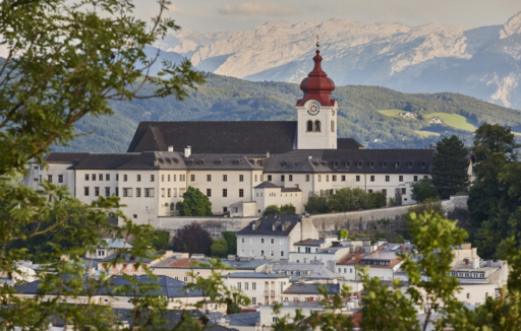Every year, the Salzburg Easter Festival draws visitors from around the world to experience a unique blend of sacred music and tradition. This prestigious event showcases the finest performances of classical music, celebrating Easter with a rich cultural program that captivates audiences. With a behind-the-scenes look at the organization of the festival and insights into its influential figures, the Salzburg Easter Festival is a must-see for those seeking a deeper understanding of Austria's musical heritage.

Highlights of the Sacred Music Performances at the Salzburg Easter Festival
The Salzburg Easter Festival is renowned for its exceptional sacred music performances that captivate audiences year after year. From beautiful choral works to exquisite instrumental pieces, the festival showcases the talents of world-class musicians in stunning venues. One of the highlights of the festival is the performance of Mozart's Requiem, a masterpiece that captures the solemnity and beauty of the Easter season. In addition, the festival often features performances of other sacred works such as Handel's Messiah and Bach's St. Matthew Passion, allowing audiences to immerse themselves in the rich musical traditions of the holiday. With the impressive skill and artistry of the performers, the sacred music performances at the Salzburg Easter Festival are truly a sight to behold.
Traditional Customs and Celebrations during the Salzburg Easter Festival
The Salzburg Easter Festival is not only a showcase of sacred music performances, but also a celebration of traditional customs and festivities. During the festival, visitors can immerse themselves in the rich cultural heritage of Salzburg and experience the unique traditions that have been passed down for generations.
One of the most iconic traditions during the Salzburg Easter Festival is the Easter market, where local craftsmen and artisans display their handcrafted goods, from intricate Easter eggs to traditional clothing and accessories. Visitors can browse the market stalls, sampling local delicacies and enjoying the festive atmosphere.
Another highlight of the festival is the traditional Easter parade, where locals don traditional costumes and parade through the streets of Salzburg, accompanied by traditional music and dance performances. This colorful procession is a sight to behold and offers visitors a glimpse into the vibrant culture of the region.
Throughout the festival, traditional Easter customs are also observed, such as the decorating of Easter eggs and the baking of Easter breads. These customs have been practiced for centuries and are an integral part of the Easter celebrations in Salzburg.
Overall, the traditional customs and celebrations during the Salzburg Easter Festival add an extra layer of cultural richness to the already impressive lineup of sacred music performances. Visitors can truly immerse themselves in the traditions of Salzburg and experience the beauty of this unique festival.
Behind the Scenes: Organizing the Salzburg Easter Festival
Organizing the Salzburg Easter Festival is no small feat, requiring meticulous planning and coordination to ensure that everything runs smoothly during the event. From selecting the repertoire and artists to managing ticket sales and logistics, a dedicated team of professionals works tirelessly behind the scenes to bring the festival to life.
One of the key aspects of organizing the Salzburg Easter Festival is choosing the repertoire for the performances. Artistic directors carefully select pieces that reflect the theme of the festival and showcase the talent of the participating musicians. They work closely with composers, conductors, and performers to create a cohesive and engaging program that will captivate audiences.
In addition to selecting the repertoire, organizers must also coordinate logistics such as securing venues, arranging accommodations for the artists, and managing ticket sales. With thousands of visitors attending the festival each year, it is crucial to ensure that everything runs smoothly and efficiently to provide a memorable experience for all attendees.
Behind the scenes, a dedicated team of production staff, technicians, and administrative personnel work tirelessly to ensure that the Salzburg Easter Festival runs seamlessly. From setting up stages and sound systems to managing artist schedules and overseeing marketing and publicity efforts, every detail is carefully executed to create a world-class event that celebrates sacred music and tradition.
Overall, the successful organization of the Salzburg Easter Festival is a testament to the hard work and dedication of everyone involved behind the scenes. It is their commitment to excellence and passion for the arts that enables this prestigious event to continue to thrive and enchant audiences year after year.
Influential Figures in the Salzburg Easter Festival's Legacy
The Salzburg Easter Festival has been shaped by a number of influential figures throughout its history. One such figure is Herbert von Karajan, a renowned conductor who founded the festival in 19Karajan's vision was to create a platform for the performance of sacred music during the Easter season, drawing on the rich musical traditions of Salzburg.
Another important figure in the festival's legacy is Helga Rabl-Stadler, who has served as the festival's president since 19Under her leadership, the Salzburg Easter Festival has continued to thrive and attract top talent from the world of classical music.
The festival has also been influenced by the contributions of artists such as Plácido Domingo, who has performed at the festival on multiple occasions. Domingo's powerful tenor voice and charismatic stage presence have captivated audiences and added to the festival's reputation as a world-class musical event.
Overall, the Salzburg Easter Festival's legacy is a testament to the enduring power of sacred music and the dedication of all those who have worked to preserve and promote this important cultural tradition.
